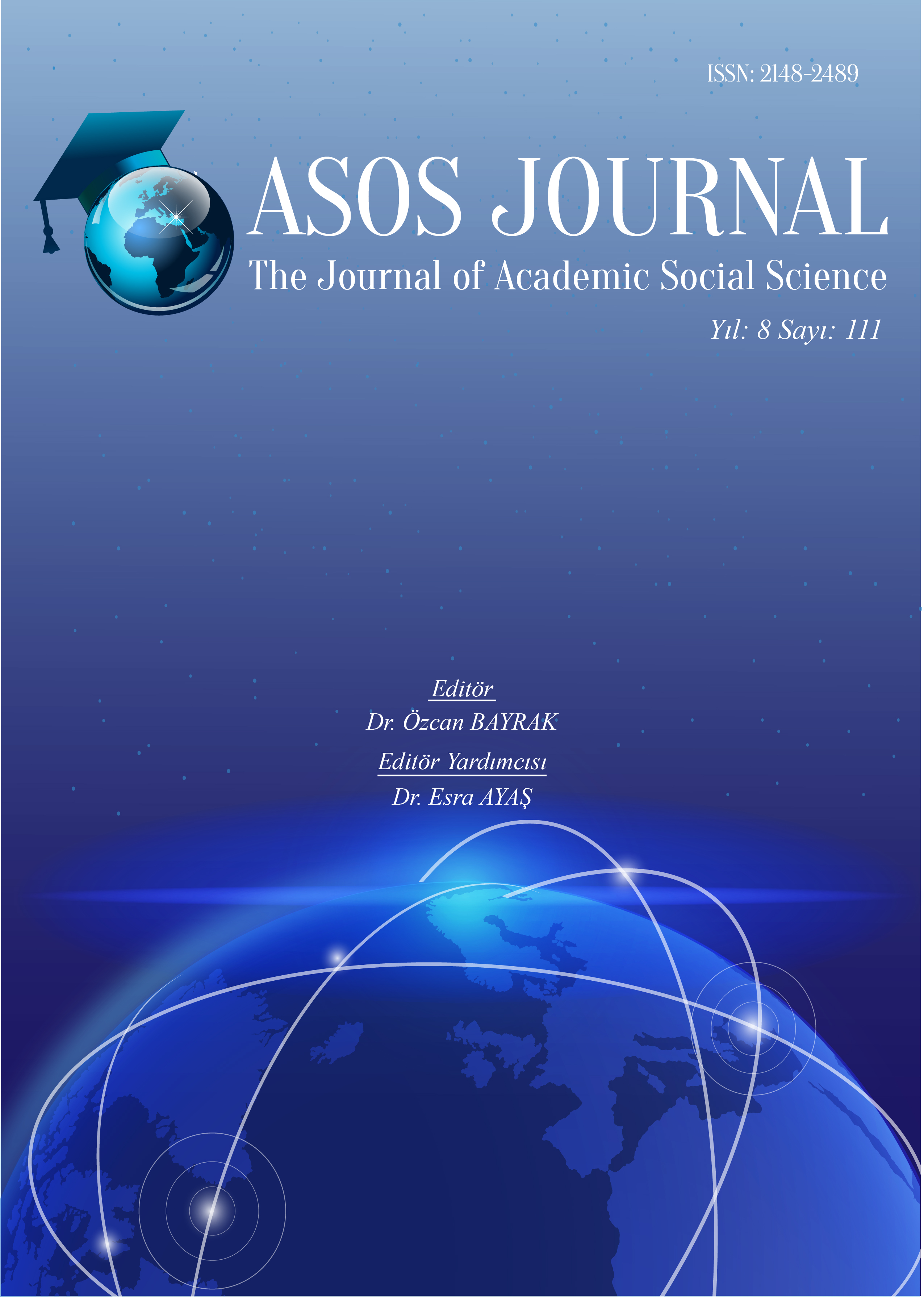Author :
Abstract
Bir ülkenin kalkınmasında, eğitim en önemli faktörlerin başında gelmektedir. Öğrencilerin eğitim hayatlarında başarılı olmaları, onların ileride daha iyi bir iş bulmalarına, verimli çalışmalarına dolayısıyla hem kendilerinin hem de toplumun refah düzeyinin yükselmesine yol açacaktır. Bu bağlamda çalışmanın amacı; Üniversite öğrencilerinin başarılarının, önemli olduğu düşünülen bazı sosyo-ekonomik faktörlere göre farklılaşıp farklılaşmadığını ve farklılaşan faktörlerde farklılaşmaya en az ve en çok neden olan grupları belirlemektir. Analizde öğrencilerin başarı düzeyinin belirleyicisi olarak alttan aldıkları derslerin sayısı dikkate alınmıştır. Çalışmada, üniversite öğrencilerinin başarılarının, önemli olduğu düşünülen bazı sosyo-ekonomik faktörlere göre farklılaşıp farklılaşmadığını belirlemek için bir anket formu oluşturulmuştur. Anket formu ile öğrencilere, akademik başarılarını etkilediği düşünülen demografik özellikleri ve sosyo-ekonomik koşullarıyla ilgili sorular yöneltilmiştir. Araştırmanın evrenini Kastamonu Üniversitesi İktisadi ve İdari Bilimler Fakültesi öğrencileri oluşturmakta olup, hazırlanan anket, olasılıklı olmayan örnekleme yöntemlerinden kota örneklemesi ile belirlenen 450 öğrenciye uygulanmıştır. Anket formunda yer alan soruların tamamı nominal ve ordinal ölçeğe göre hazırlandığından, öğrencilerin başarılarında önemli görülen bazı sosyo-ekonomik faktörlere göre farklılıkların belirlenmesi için parametrik olmayan analiz yöntemlerinden Ki-kare analizi kullanılmıştır. Farklılıklara en az ve en çok neden olan grupları belirlemek için de artık değer (kalıntı) analizi yapılmıştır. Yapılan analiz sonucu yaşları daha küçük olan öğrencilerin, köy ve kasaba gibi küçük yerleşim yerlerinden gelen öğrencilerin ve yoksul öğrencilerin daha başarılı oldukları, öğrencilerin başarısında ailenin desteğinin önemli olduğu, devlet yurtlarında öğrencilerin iyi bir çalışma ortamına sahip oldukları sonuçlarına ulaşılmıştır.
Keywords
Abstract
Education is one of the most important factors in the development of a country. Students' success in their education life will lead them to find a better job in the future, to work efficiently, and to increase the welfare level of both themselves and the society. In this context, the aim of the study is to determine whether the achievements of university students differ according to some socio-economic factors that are considered to be important, and the groups that cause the least and the most differentiation in differentiating factors. In the analysis, the number of failed courses as a determinant of students' success level was taken into consideration. In the study, a questionnaire was created to determine whether the achievements of university students differ according to some socio-economic factors that are considered important. With the questionnaire form, students were asked questions about their demographic characteristics and socio-economic conditions, which are thought to affect their academic success. The universe of the research is composed of students of Kastamonu University Faculty of Economics and Administrative Sciences, and the prepared questionnaire was applied to 450 students determined by quota sampling from non-probability sampling methods. Since all of the questions in the questionnaire form were prepared according to nominal and ordinal scales, Chi-square analysis, which is one of the non-parametric analysis methods, was used to determine the differences according to some socio-economic factors that are considered important in students' achievements. Residual value analysis was conducted to determine the groups that caused the least and the most differences. As a result of the analysis, it has been reached that the students who are younger, the students coming from small settlements such as villages and towns and poor students are more successful, the support of the family is important in the success of the students, and the state dormitories have a good working environment.
Keywords
- Agresti, Alan, (2007), An Introduction to Categorical Data Analysis, Hoboken, NJ: Wiley.
- Agresti, Alan, Franklin, Christine, ve Klingenberg, Bernhard, (2017), Statistics: The Art and Science of Learning From Data, Global Edition, 4/E, Pearson Education, England.
- Aslanargun, Engin, Bozkurt, Sinan ve Sarıoğlu, Selma, (2016), “Sosyo Ekonomik Değişkenlerin Öğrencilerin Akademik Başarısı Üzerine Etkileri”, Uşak Üniversitesi Sosyal Bilimler Dergisi, 2016 9/3, 214-234.
- Ayyıldız, Tülay, Konuk Şener, Dilek, Veren, Funda, Kulakçı, Hülya, Akkan, Fatma, Ada, Asuman, Aldoğan, Ayşe, Yeral, Kezban, Emek, Azize, Tetik, Derya ve Dinç, Gülşah, (2014), “Hemşirelik Öğrencilerinin Akademik Başarılarını Etkileyen Faktörler”, Acıbadem Üniversitesi Sağlık Bilimleri Dergisi, Cilt: 5, Sayı: 3.
- Berber, Metin, (2011), İktisadi Büyüme ve Kalkınma, 4. Baskı, Derya Kitabevi, Trabzon.
- Çiftçi, Cemil ve Çağlar, Atalay (2014). “Ailelerin Sosyo-Ekonomik Özelliklerinin Öğrenci Başarısı Üzerindeki Etkisi: Fakirlik Kader Midir?” International Journal of Human Sciences, 11(2), 155-175. doi: 10.14687/ijhs.v11i2.2914.
- Delucchi, Kevin, L., (1983), “The Use and Misuse of Chi-Square”, Lewis and Burke revisited. Psychological Bulletin, 94, 166-176. doi.org/10.1037/0033-2909.94.1.166
- Field, Andy, (2006), Discovering Statistics Using SPSS, Second Edition, Sage Publications, London, Thousand Oaks, New Delhi
- Gök, Mehmet, (2015), “Bişkek Şehrindeki 9. 10. ve 11.Sınıf Öğrencilerinin Akademik Başarısını Etkileyen Bazı Faktörlerin Analizi”, Manas Sosyal Araştırmalar Dergisi, Cilt: 4 Sayı: 1.
- Han, Ergül ve Kaya, Ayten Ayşen, (2008), Kalkınma Ekonomisi: Teori ve Politika, 6. Baskı, Nobel Yayın Dağıtım, Ankara.
- Kaya, Ahmet, Bozaslan, Hasan, ve Genç, Gülten, (2012), “Üniversite Öğrencilerinin Anne- Baba Tutumlarının Problem Çözme Becerilerine, Sosyal Kaygı Düzeylerine ve Akademik Başarılarına Etkisi”, Dicle Üniversitesi Ziya Gökalp Eğitim Fakültesi Dergisi, 18 (2012), 208-225.
- Nakip, Mahir, ve Yaraş, Eyyub, (2016), SPSS Uygulamalı Pazarlama Araştırmalarına Giriş, Beşinci Baskı, Seçkin Yayıncılık, Ankara.
- Nakip, Mahir, ve Yaraş, Eyyub, (2017), SPSS Uygulamalı Pazarlamada Araştırma Teknikleri, Dördüncü Baskı, Seçkin Yayıncılık, Ankara.
- Önür, Hıdır, (2013), “Gelir Düzeyinin Eğitim İmkânlarından Yararlanma Düzeyine Etkisi: Süleyman Demirel Fen Lisesi ve Atatürk Lisesi Örneği”, Süleyman Demirel Üniversitesi Sosyal Bilimler Enstitüsü Dergisi, Yıl: 2013/2, Sayı:18, 259-277.
- Özer, Hüseyin ve Sarı, Ahmet, (2009), “Kovaryans Analizi Modelleriyle Üniversite Öğrencilerinin Başarılarını Etkileyen Faktörlerin Belirlenmesi: Atatürk Üniversitesi İİBF Öğrencileri İçin Bir Uygulama”, Dokuz Eylül Üniversitesi İktisadi ve İdari Bilimler Fakültesi Dergisi, Cilt:24, Sayı:2, 105-126.
- Sarıer, Yılmaz, (2016), “Türkiye’de Öğrencilerin Akademik Başarısını Etkileyen Faktörler: Bir Meta-analiz Çalışması”, Hacettepe Üniversitesi Eğitim Fakültesi Dergisi, 31 (3), 609627.
- Sharpe, Donald, (2015), “Your Chi-Square Test is Statistically Significant: Now What?”, Practical Assessment, Research & Evaluation, 20(8). Available online: http://pareonline.net/getvn.asp?v=20&n=8
- Tunçel, Zehra ve Saracaloğlu A. Seda, (1999), “Spor Yüksekokulları Öğrencilerinin Başarılarını Etkileyen Faktörler”, Gazi Beden Eğitimi ve Spor Bilimleri Dergisi, Cilt IV, Sayı: 1, 63-76.
- Yumuşak, İbrahim G., (2008), “Beşeri Sermayenin İktisadi Önemi ve Türkiye’nin Beşeri Sermaye Potansiyeli”, Sosyal Siyaset Konferansları Dergisi, Sayı:55.





